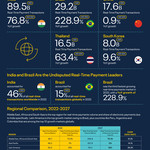- 195.0B real-time payments (RTP) transactions were recorded globally in 2022, a YoY growth of 63.2%, according to the 2023 Prime Time for Real-Time report from ACI Worldwide and GlobalData
- India remains the undisputed RTP leader — responsible for 46% of all transactions worldwide — followed by Brazil, China, Thailand and South Korea
- Governments and regulators around the world are taking steps to drive adoption of RTPs as a path to economic growth and greater financial inclusion
MIAMI–(BUSINESS WIRE)–New sophisticated use cases for consumers and businesses are driving global RTP volumes to record highs, with 195.0B RTP transactions recorded globally in 2022 — a YoY growth of 63.2% — according to the 2023 Prime Time for Real-Time report, published by ACI Worldwide (NASDAQ: ACIW), a global leader in mission-critical, real-time payments software, in partnership with GlobalData, a leading data and analytics company.
- 511.7B real-time transactions globally are forecast by 2027, representing a 2022-2027 compound annual growth rate (CAGR) of 21.3%.
- By 2027, RTPs are expected to account for 27.8% of all electronic payments globally.
- India remains the undisputed RTP leader, with a staggering 89.5B transactions in 2022 and a YoY growth rate of 76.8%. India accounted for 46% of all global real-time transactions in 2022.
- Brazil was the third fastest-growing RTP market in 2022, with a YoY growth of 228.9%, and is in second place in transactions, with 29.2B in 2022, representing 15% of all global real-time transactions.
- China, Thailand and South Korea are third, fourth and fifth, respectively, on the list of the top RTP markets, with 17.6B, 16.4B and 8B transactions, respectively, in 2022.
Governments and regulators are taking notice of consumer adoption
With consumers and businesses around the world demanding cheaper, faster and more efficient ways to pay, and merchant acceptance of RTPs on the rise, consumer and business adoption via popular new use cases is heating up. This year’s Prime Time for Real-Time report analyzes RTP transactions per head of population per month for the first time, highlighting where consumers and businesses most actively use RTP:
- Bahrain, a country of just 1.5 million people, is forecast to have the highest level of RTP consumer adoption by 2027, with 83.3 RTP transactions per head per month projected.
- Consumers in Brazil (#2) and Thailand (#3) are expected to make 51.8 and 43.6 RTP transactions per month, respectively, by 2027.
- Four European countries — Netherlands, Sweden, Denmark and Finland — are forecast among the top 10 countries for RTP consumer adoption by 2027.
- The U.K., Canada, the U.S., Germany, France and Italy — all top 10 global economies by GDPi — are forecast to place 17th, 19th, 33rd, 34th, 35th and 42nd, respectively, for consumer adoption in 2027.
“This year’s report highlights how consumer and business adoption of real-time payments accelerates when the conditions are right,” said Craig Ramsey, global head of real-time payments and banking, ACI Worldwide. “The countries at the top of our league table — Bahrain, Brazil and Thailand — are all relatively recent enablers of real-time payments. Concerted industry collaboration and government mandates, widespread merchant adoption, strong brand recognition for a scheme, and related services, such as digital wallets, have provided the perfect combination for strong growth in these markets.”
Governments and regulators in other countries are beginning to take notice and have launched initiatives to emulate the success of the most successful RTP markets.
In Europe, the EU Commission has proposed a law mandating RTPs across its 27 member states. The U.K. has embarked on its New Payments Architecture program, which aims to modernize the country’s RTP rails. In the U.S., the Federal Reserve recently announced the launch date for its highly anticipated FedNow service to expand RTP access in the U.S. — a highly significant event in a market where regulators tend to lean toward non-intervention.
“Real-time payments are the future of modern, digital economies. Governments and regulators around the world are beginning to understand this and increasingly see them as a path to drive economic growth and financial inclusion,” said Thomas Warsop, interim president and CEO, ACI Worldwide.
“Real-time payments will help to secure the competitiveness of banks and financial services providers. They remove payments friction, contribute to greater liquidity and ultimately increase customer stickiness. They complement the holistic digital proposition of modern financial institutions.
“Banks should evaluate whether they are truly maximizing existing real-time rails in their market. Ultimately, the extent to which they make real-time payments part of their offering is a strategic decision. It seems increasingly clear, however, that limiting their commitment to the minimum also means limiting their potential share of the future payments market,” Warsop concluded.
Regional Spotlights
North America: July’s U.S. FedNow launch will be a major catalyst for growth
- RTP transactions in North America are expected to grow from 3.9B in 2022 to 13B by 2027, a CAGR of 27.3%. While North America currently accounts for just 2% of all RTPs globally, it has the potential to develop into an extremely high-growth region in the future.
- As a proportion of electronic payments, RTPs are forecast to be just 5% by 2027 in North America — lower than in all other global regions: Europe (13%), Asia Pacific (APAC – 12%), Middle East, Africa and South Asia (MEASA – 79%) and Latin America (LATAM – 56%).
- Consumer adoption, measured as transactions per month per head of population, was low across the region in 2022 — the U.S. and Canada ranked 33rd and 19th, respectively, worldwide.
- Mobile wallet adoption is strong and growing fast, with 45% of consumers holding and/or using a mobile wallet in 2022, compared to 38% in 2021 and just 13% in 2018.
- Overall fraud rates remain flat, as 28% of consumers reported being a victim of fraud in 2022, compared to 26% in 2021. Social engineering scams and digital wallet account hacks are the only fraud types that grew from 2021 to 2022, speaking both to the increased adoption of digital payments and the corresponding evolution of fraudsters’ tactics.
- The launch of FedNow in the U.S. in July 2023 could be a major catalyst for RTP adoption — it will expand RTP access to smaller banks and feature new services, such as Request for Pay, from day one.
Europe: Major change is on the horizon with the new EU RTP mandate
- RTP transactions in Europe are expected to grow from 13.2B in 2022 to 34.2B by 2027, with a CAGR of 21%.
- Four European countries feature in the global top 10 for consumer adoption for 2027 — Netherlands, Sweden, Finland and Denmark.
- Mobile wallets are increasingly popular, with 41% of consumers holding and/or using a mobile wallet in 2022, compared to 31% in 2021 and 12% in 2018.
- Overall fraud rates are stagnant or in decline. However, social engineering scams associated with Authorized Push Payment (APP) fraud are on the rise.
- Major change is on the horizon. The EU Commission has proposed to mandate RTPs across its 27 member states, whereby banks must offer instant payments at the same cost or lower than standard credit transfers. The proposed law would disrupt the market significantly, as charges of up to EUR 1.50 are common for instant payments at the moment.
LATAM: Top growth market with Brazil the clear leader in adoption and growth
-
LATAM is one of the top growth regions globally. RTP transactions are expected to grow from 33B in 2022 to 119.5B by 2027, a CAGR of 29.3%.
- The region is forecast to have one of the highest proportions of RTPs as a portion of electronic payments by 2027 (56%). Brazil has become a major global player in RTPs and is responsible for 90% of RTP volumes in the region due to the strength of PIX.
- Brazil was the world’s second biggest RTP market by volume in 2022.
- Brazil is second in global RTP consumer adoption, behind India. The majority of its population has access to the RTP service PIX via mobile, and Brazil is expected to have 52 RTP transactions per head of population per month by 2027.
- Mobile wallets have exceeded a critical mass in the region, with 65% of consumers holding and/or using a mobile wallet in 2022, compared to 58% in 2021 and 15% in 2018.
- Social engineering scams associated with APP fraud have risen to comprise 27% of reported fraud incidents in LATAM in 2022, up from 16% in 2021. Card details stolen online dropped from 20% to 13% in the same period.
- Growing markets to watch in LATAM include Mexico, which for the first time is among the world’s top RTP markets (#9), as well as Peru, Argentina and Colombia, which feature on the list of the world’s top 10 growth markets.
APAC: Leads the world in terms of real-time, cross-border initiatives
- APAC is one of the most innovative RTP markets. Advanced, user-friendly services and features such as QR-code payments and mobile-native experiences are driving adoption across the region.
- RTP transaction volumes in the region are expected to grow from 49.2B in 2022 to 96.7B by 2027, a CAGR of 14.1%, while APAC’s nations are at different stages of real-time payments implementation
- Indonesia is the latest major country in the regions to adopt RTP and is set for rapid real-time payments growth at CAGR of 81.9% between 2022 and 2027.
- Most APAC countries have had real-time payments schemes in place for a few years. Projected five-year growth is continuing and accelerating, with CAGR for Malaysia at 19.7%, the Philippines at 18.7%, Singapore at 18.3% and Australia at 16.3%. This robust growth is driven by regular launch of new products by these schemes.
- Governments and central banks in the APAC region play a key role in adoption. There has been strong push from the governments of APAC countries especially in Indonesia and Malaysia for RTP adoption which is enabling the industry to adopt digital payments.
- Several cross-border RTP integrations are live between APAC countries, and more are in development.
- Consumers in APAC are the most avid users of mobile wallets, with eight out of the top 10 countries for mobile wallet adoption in that region.
MEASA: Fastest-growing market globally due to the might of India
- MEASA is a huge and diverse RTP market, with India as the world’s undisputed RTP leader, the Middle East as one of the fastest growing regions, and Africa as a key growth market to watch.
- The region saw 95.7B RTP transactions in 2022, mainly due to India’s dominant role. RTP transactions are expected to grow to 250B by 2027, a CAGR of 21.2%.
- In 2022, 46% of all global RTP transactions originated in India. Volumes reached a new high of 89.5B in 2022, representing 81% of electronic payments in India. They are forecast to grow at a CAGR of 21.3% between 2022 and 2027.
-
The Middle East is the fastest-growing RTP market globally. RTP transactions are expected to grow from 675M in 2022 to 2.6B by 2027, a CAGR of 30.6%.
- Saudi Arabia is currently the biggest RTP market in the Middle East, followed by Bahrain.
- Bahrain is the global leader in consumer adoption, forecast to have 84 RTP transactions per head of population per month by 2027.
- Governments and regulators in the Middle East are setting new mandates for adoption. Several countries — including U.A.E., Qatar, Kuwait and Oman — are expected to launch domestic RTP schemes soon, with innovative features and overlay services high on the agenda.
- Nigeria is one of the top 10 RTP markets globally, and South Africa is Africa’s second biggest market, having launched RTPs in March 2023. This vast and rapidly growing continent is full of opportunity for RTPs, with many African countries planning to develop and launch domestic RTP schemes.
ACI’s Inside Real-Time
This year, we are excited to launch Inside Real-Time — a new, multi-channel media platform — as the definitive guide and go-to source for the world’s RTP stories, including exclusive content exploring the latest developments and opportunities in the world of RTPs and how real‑time is empowering consumers, merchants, businesses and banks. ACI’s Prime Time for Real-Time report is the foundation of this new platform.
About ACI Worldwide
ACI Worldwide is a global leader in mission-critical, real-time payments software. Our proven, secure and scalable software solutions enable leading corporations, fintechs and financial disruptors to process and manage digital payments, power omni-commerce payments, present and process bill payments, and manage fraud and risk. We combine our global footprint with a local presence to drive the real-time digital transformation of payments and commerce.
© Copyright ACI Worldwide, Inc. 2023
ACI, ACI Worldwide, ACI Payments, Inc., ACI Pay, Speedpay and all ACI product/solution names are trademarks or registered trademarks of ACI Worldwide, Inc., or one of its subsidiaries, in the United States, other countries or both. Other parties’ trademarks referenced are the property of their respective owners.
i https://data.worldbank.org/indicator/NY.GDP.MKTP.CD?most_recent_value_desc=true
Contacts
Media
Nick Karoglou: nick.karoglou@aciworldwide.com
Katrin Boettger: katrin.boettger@aciworldwide.com
+44 (0)7776 147910







